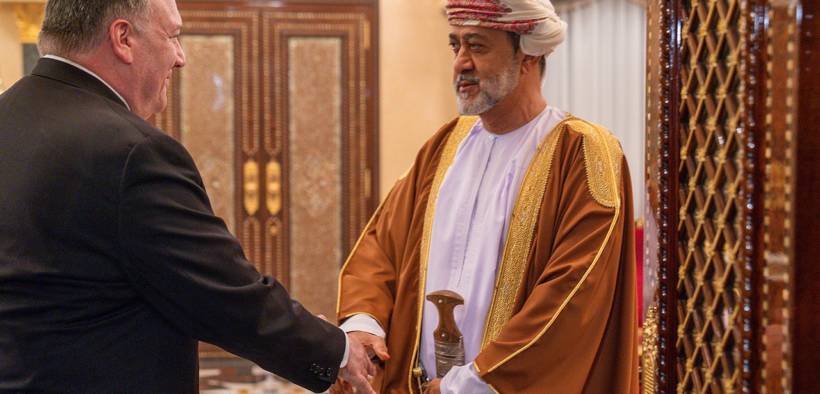Sultan Haitham bin Tarik’s Address To The Omani People Foreshadows Changes To Come

Sultan Haitham bin Tarik al-Said addressed the citizens of Oman Sunday afternoon in his second speech since his appointment in early January.
End of the 40-day mourning period
With the passing of the official 40-day mourning period for the late Sultan, Qaboos bin Said, His Majesty greeted his nation:
“Dear honorable citizens, our dear nation has lost on the 10th of January, the dearest and finest of its men — the founder of its modern state and renaissance, the man of wisdom and peace, the icon of tolerance and harmony — the late His Majesty Sultan Qaboos bin Said bin Taimur…to Allah we belong, and to Him is our return.”
He credited both his predecessor and the Omani people with “a great transformation in building a modern state, establishing advanced infrastructure all over the country.” Vowing to continue the “blessed renaissance” his cousin began in the 1970s, he stated that Oman would “always remain our supreme goal, in all actions and pursuits.”
“We will dedicate our lives to Oman, and to the children of Oman.”
In a promise to strengthen the education sector for the phases of development to come, His Majesty Sultan Haitham referred to Oman’s youth as “the wealth of a nation, and the arms that build it, they are its present and future. We will always listen to them and their needs, interests and aspirations.”
Noting that freedom and equality are pillars upon which modern Oman was built, the new leader expressed hopes “that women will enjoy their rights as guaranteed by law.”
Goal Setting
At the top of the new Sultan’s list of goals — undertaking “necessary measures” to restructure the state, modernize laws, and streamline “procedures, performance, governance, integrity and accountability.” He further affirmed the government’s commitment to reducing national debt and increasing income.
A nation living beyond it’s means
The Omani government has lived and operated well beyond its means for years, a tab covered only by issuing substantial debt. S&P has stated that Sultan Haitham “has a narrowing window to address the country’s fiscal and economical challenges” and that they anticipate that he “will face a difficult trade-off in the coming months between addressing social concerns, partly arising from weak growth and high youth unemployment, and rising fiscal, external, and funding pressures.”
Oman’s current GDP ratio is expected to exceed 60 percent by the close of 2020 and projected to reach 63 percent in 2021. The government’s failure to undertake necessary austerity measures in recent years resulted in S&P’s issuance of a BB credit rating with negative outlook.
Oil dependent economy with dwindling reserves
In response to the nation’s current struggles, Sultan Haitham has pledged to diversify Oman’s economy, which continues to rely heavily on its “dwindling oil resources”. Oman’s 10th 5-year plan (covering the years 2020-2025) aims to implement Vision 2040 — the result of the Oman 2040 committee which the new sultan spearheaded — in an effort to economically diversify the Mid-Eastern nation. It focuses on five key sectors believed to hold high potential to produce substantial economic returns. The sectors identified include agriculture and fisheries, manufacturing, logistics and transport, energy and mining, and tourism. They will face substantial competition from their fellow Gulf Cooperation Council (GCC) members who have already developed the same sectors within their own borders.
The Sultan also expressed that the government will focus on “innovation, artificial intelligence, and advanced technology…in addition to training and enabling youth…so that it could form a cornerstone in the national economy.”
Financial woes and the need for foreign investment
The World Bank has warned that “a key risk facing Oman is that the pace of fiscal and structural reforms may slow, hurting investor confidence and prospects for debt sustainability. To mitigate this risk, the government needs to press ahead with planned reforms on revenue mobilization (namely the introduction of VAT), deeper fiscal adjustment through wage bill and subsidy reform, and more efficient public sector delivery.”
Opacity surrounding laws and regulations for foreign investors, corruption cases involving high ranking government officials and state-owned oil company executives, and difficulties with the Omanisation Programme have thus far hindered the foreign investment required to support such diversification.
Omanisation
The Omanisation Programme, in place since 1999, works toward the replacement of expatriate workers with Omani personnel in an effort to ensure employment for Oman’s rapidly growing population. The government aims to reduce the nation’s reliance on foreign workers while also overcoming the preference Omanis hold for government jobs. The government attempts to entice employers into compliance with Omanisation through a reward system and by offering conforming companies preferential treatment in their dealings with the Ministry.
However, obstacles to the fulfillment of Omanisation — most notably the increasing number of low-paying jobs in the private sector that pay the official minimum salary requirement for nationals — do not appeal to locals. As a result, much of the private sector maintains a strong reliance on foreign workers in lower level positions. Additionally, the young average age and lack of experience in the available Omani workforce present significant challenges to the installation of locals in senior positions.
In closing, Sultan Haitham indicated the need for solid determination and great sacrifices for the future development of Oman. This could prove troublesome for the new leader as he comes to the helm at a time the country is in need of yet unaccustomed to the level of austerity required to propel it into the future.








Same problem everywhere in the world. An essentially unsupportable overpopulation. Debt simply prolongs the dying.